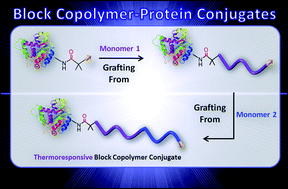Scientists at Southern Methodist University, USA, have shown that retaining the active end group functionality during grafting-from RAFT polymerizations from model proteins can give thermoresponsive diblock copolymer–protein conjugates. The team behind the research claim that the reduced steric limitations of this method could help create a wide variety of block copolymer bioconjugates with high molecular weight synthetic components.
Interested to know more? Why not read the full paper: Hongmei Li, Ming Li, Xiao Yu, Abhijeet P. Bapat and Brent S. Sumerlin, Polym. Chem., 2011, 2, 1531-1535
To keep up-to-date with all the latest research, sign up for the journal’s e-alerts or RSS feeds or follow Polymer Chemistry on Twitter or Facebook.











